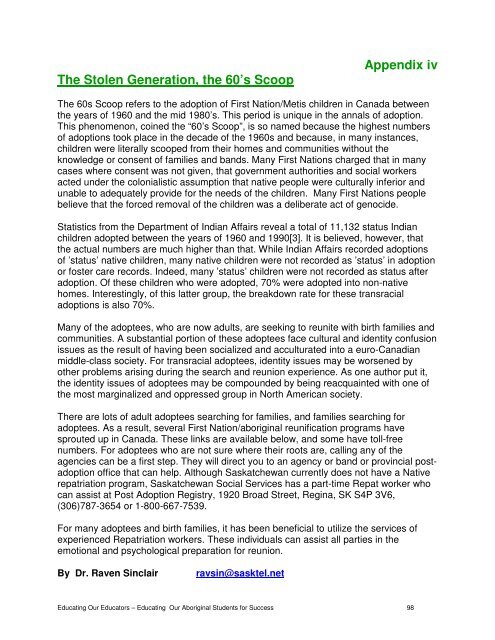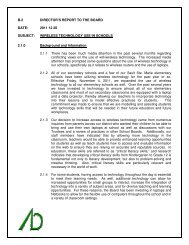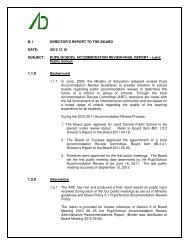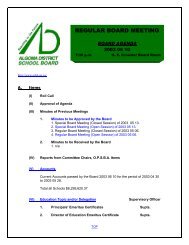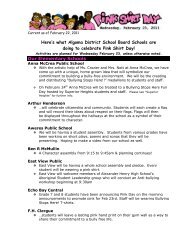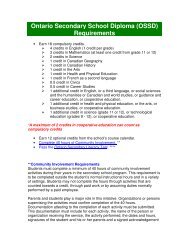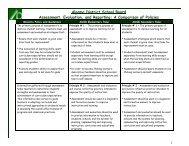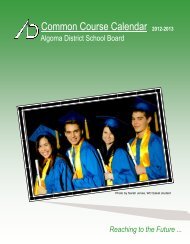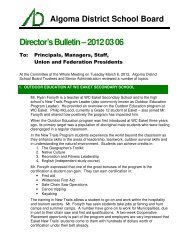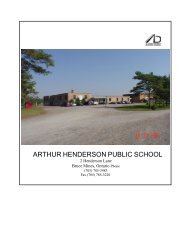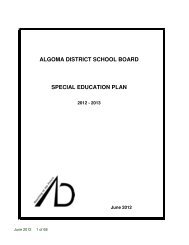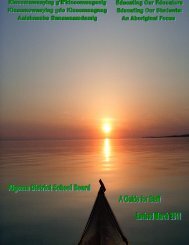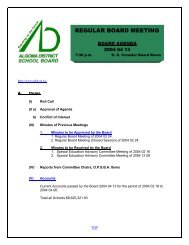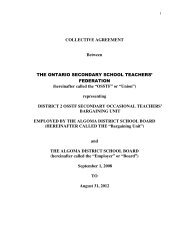Educating Our Educators Guide for Staff - Algoma District School ...
Educating Our Educators Guide for Staff - Algoma District School ...
Educating Our Educators Guide for Staff - Algoma District School ...
- No tags were found...
Create successful ePaper yourself
Turn your PDF publications into a flip-book with our unique Google optimized e-Paper software.
The Stolen Generation, the 60’s ScoopAppendix ivThe 60s Scoop refers to the adoption of First Nation/Metis children in Canada betweenthe years of 1960 and the mid 1980’s. This period is unique in the annals of adoption.This phenomenon, coined the “60’s Scoop”, is so named because the highest numbersof adoptions took place in the decade of the 1960s and because, in many instances,children were literally scooped from their homes and communities without theknowledge or consent of families and bands. Many First Nations charged that in manycases where consent was not given, that government authorities and social workersacted under the colonialistic assumption that native people were culturally inferior andunable to adequately provide <strong>for</strong> the needs of the children. Many First Nations peoplebelieve that the <strong>for</strong>ced removal of the children was a deliberate act of genocide.Statistics from the Department of Indian Affairs reveal a total of 11,132 status Indianchildren adopted between the years of 1960 and 1990[3]. It is believed, however, thatthe actual numbers are much higher than that. While Indian Affairs recorded adoptionsof ’status’ native children, many native children were not recorded as ’status’ in adoptionor foster care records. Indeed, many ’status’ children were not recorded as status afteradoption. Of these children who were adopted, 70% were adopted into non-nativehomes. Interestingly, of this latter group, the breakdown rate <strong>for</strong> these transracialadoptions is also 70%.Many of the adoptees, who are now adults, are seeking to reunite with birth families andcommunities. A substantial portion of these adoptees face cultural and identity confusionissues as the result of having been socialized and acculturated into a euro-Canadianmiddle-class society. For transracial adoptees, identity issues may be worsened byother problems arising during the search and reunion experience. As one author put it,the identity issues of adoptees may be compounded by being reacquainted with one ofthe most marginalized and oppressed group in North American society.There are lots of adult adoptees searching <strong>for</strong> families, and families searching <strong>for</strong>adoptees. As a result, several First Nation/aboriginal reunification programs havesprouted up in Canada. These links are available below, and some have toll-freenumbers. For adoptees who are not sure where their roots are, calling any of theagencies can be a first step. They will direct you to an agency or band or provincial postadoptionoffice that can help. Although Saskatchewan currently does not have a Nativerepatriation program, Saskatchewan Social Services has a part-time Repat worker whocan assist at Post Adoption Registry, 1920 Broad Street, Regina, SK S4P 3V6,(306)787-3654 or 1-800-667-7539.For many adoptees and birth families, it has been beneficial to utilize the services ofexperienced Repatriation workers. These individuals can assist all parties in theemotional and psychological preparation <strong>for</strong> reunion.By Dr. Raven Sinclairravsin@sasktel.net<strong>Educating</strong> <strong>Our</strong> <strong>Educators</strong> – <strong>Educating</strong> <strong>Our</strong> Aboriginal Students <strong>for</strong> Success 98


